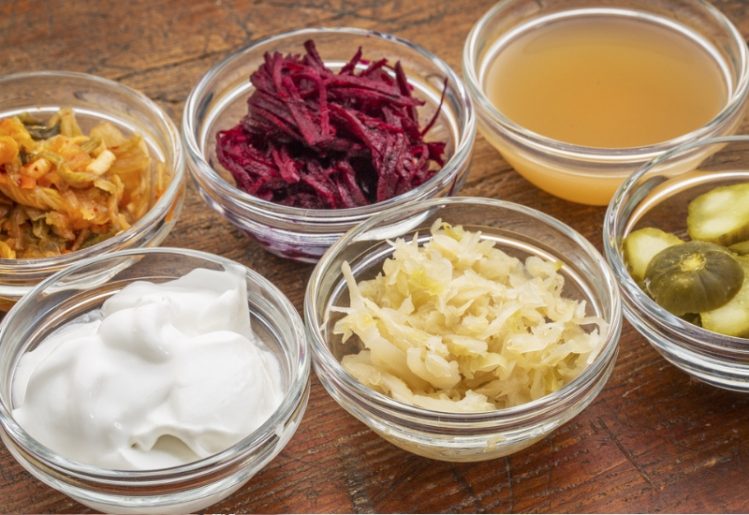As we all know, the world is full of both beneficial and harmful types of bacteria that we ingest in our food, breathe in the air or otherwise come into contact with on a daily basis. Probiotics are beneficial microorganisms that are commonly found in fermented foods and help protect the body in a variety of ways. New studies find probiotics boost immune system functioning, leading to a renewed interest in finding natural ways to get more of these “friendly” bacteria.
What Are Probiotics?
 Probiotics are beneficial bacteria that play a host of helpful roles in the human body. While there are hundreds of probiotic supplements on the market today, that wasn’t always the case; in the past, people had to rely on healthy diets to get a good supply of these beneficial forms of bacteria. In addition to modern supplements, probiotics are found in foods like sauerkraut, kimchi, kefir, tempeh and plain yogurt.
Probiotics are beneficial bacteria that play a host of helpful roles in the human body. While there are hundreds of probiotic supplements on the market today, that wasn’t always the case; in the past, people had to rely on healthy diets to get a good supply of these beneficial forms of bacteria. In addition to modern supplements, probiotics are found in foods like sauerkraut, kimchi, kefir, tempeh and plain yogurt.
There are several different strains of probiotics, which is why it’s still important to eat a broad range of fermented foods. Each strain provides a different benefit to human health. Once ingested, probiotics make their way to a part of the large intestines called the gut microbiome. Once there, they join trillions of other microorganisms to make up a thriving community that interacts with the immune system and other systems throughout the body.
The microorganisms in the gut microbiome help the body fight off disease and maintain good organ functioning, among other things. While more and more research focuses on how probiotics interact with the body, scientists are finding evidence that probiotics are essential to the efficient functioning of our immune systems.
How Do Probiotics Boost Immune System Functioning?
Up to 80 percent of the immune system’s focus is in the digestive system, including the large intestines. The reason is that this where the largest percentage of harmful microorganisms enter the body, and the immune system tries to attack harmful organisms as soon as they are detected. This is also why the gut microbiome and all of the beneficial bacteria that it contains are located in the large intestines. The helpful bacteria in the gut work together with the immune system to protect against disease and infection.
The probiotics that exist in the gut microbiome help the digestive system function more efficiently and ensure nutrients are more thoroughly absorbed from the foods we eat. Additionally, they work to protect us from developing certain diseases, suggesting that probiotics boost immune system in some very significant ways. Even though their primary focus is on gut health, research suggests probiotics have an even bigger impact on overall health.
In 2005, a study was conducted involving a group of several hundred subjects, which were divided into a test group and a control group. The test group was given a daily probiotic supplement, while the control group took placebos. After a three-month period, over 35 percent of the subjects in the control group reported suffering from digestive health issues and had developed other physical health problems. The group taking the probiotics didn’t report any health issues.
This same experiment was repeated in 2008, except that researchers were specifically interested in how probiotics would affect allergic rhinitis. After a five-month period, the subjects taking the probiotics were examined for the condition. The researchers found that their production of cytokines had increased, strengthening the immune system’s response to the condition.
A recent study focused on how probiotics interacted with the immune system to help protect the body. The scientists participating in the study included Fang Yan of Nashville’s Vanderbilt University School of Medicine and D.B. Polk of the University of Southern California. The team found that once in the gut, certain genes and other compounds in probiotics target the immune system and help to regulate how it responds to diseases and infections.
While research suggests that probiotics can help the body react to diseases in this way, they also demonstrated an ability to prevent certain conditions from developing. This was especially true for immunological diseases such as allergies and viral infections. While the results so far are promising, researchers hope future studies will reveal more about how probiotics help regulate the immune system’s responses.
How Can You Get Probiotics Naturally?
There are many ways to ensure you’re getting the beneficial bacteria you need in your diet to support a healthy microbiome.
Yogurt
 Plain yogurt is made from fermented milk, which means it’s full of helpful bacteria, including bifidobacteria and lactic acid. These microorganisms have been shown to strengthen bone density and help prevent bone loss. Some research also suggests they can help maintain healthy blood pressure.
Plain yogurt is made from fermented milk, which means it’s full of helpful bacteria, including bifidobacteria and lactic acid. These microorganisms have been shown to strengthen bone density and help prevent bone loss. Some research also suggests they can help maintain healthy blood pressure.
Kefir
If you’re unfamiliar with kefir, it’s made from kefir grains that are mixed with milk from a cow or goat. Since kefir grains contain lactic acid, this food also helps benefit bone health. Additionally, it has been found effective in improving digestive health and guarding against infection.
Sauerkraut
Served with sausage and other traditional dishes, sauerkraut provides a broad range of nutrients that are essential to human health. In addition to being rich in fiber and containing vitamins B, C and K, it also contains powerful antioxidants that protect eye health. Unpasteurized sauerkraut is preferred, because the pasteurization process kills the probiotics that it contains.
Tempeh
This product is made from fermented soybeans and rolled into a patty. It’s flavor and texture has been compared to mushrooms and it’s often used as a meat substitute. The fermentation process helps make it easier for the gut to absorb the nutrients it contains, including a large supply of vitamin B12.
Kimchi
Primarily served in Korea, kimchi is a side dish that’s made from cabbage, crushed red pepper, salt, ginger, garlic and scallions. It’s high lactic acid content means it helps improve digestive health.


